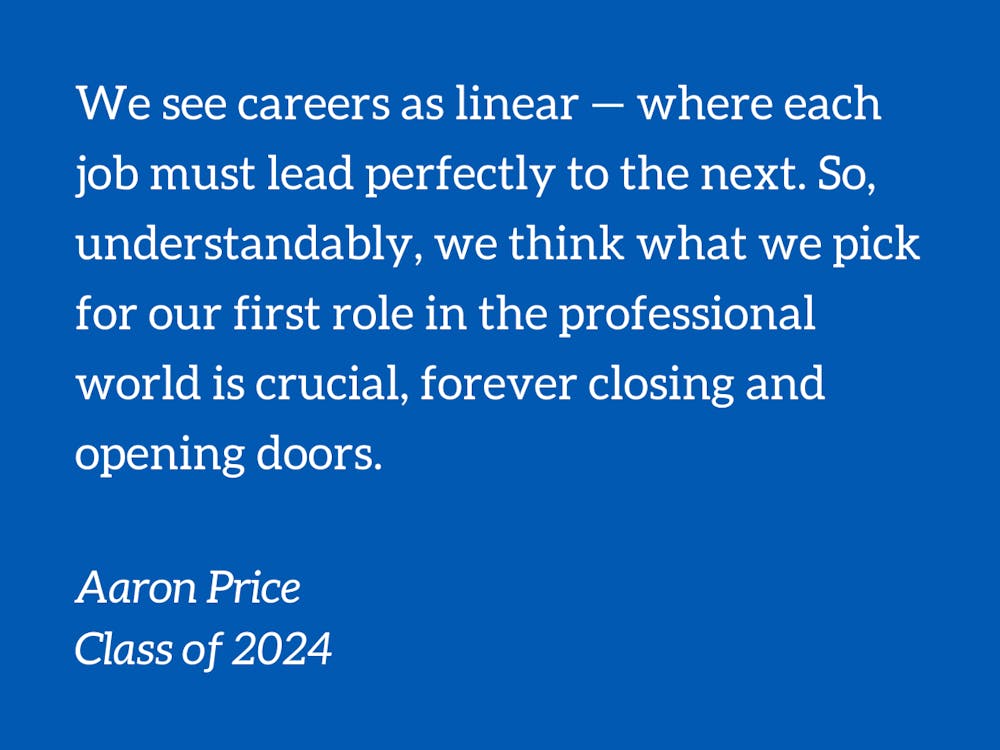Duke and anxiety go hand in hand. Freshman year, it was worry about making friends. Sophomore year — joining the right clubs. Junior year was getting a prestigious internship. And now as seniors, we worry about scoring a great first job.
I went to a Duke Conversations dinner last week (highly underutilized opportunity - you should check them out). We ate on the roof of a barn at the home of Sonke Johnsen in the Biology Department. Overlooking the rolling fields and serene quiet of the property, you couldn’t help but notice the jarring worry exuding from the group of students.
The topic for the conversation was life’s dreams. Fitting for Johnsen to talk about — after graduating from Swarthmore with a degree in math, his first jobs were as a Kindergarten teacher and a carpenter before he started graduate school in biology.
The dinner, which became more like a group therapy session, highlighted a common theme for Duke seniors — we see careers as linear, where each job must lead perfectly to the next. So, understandably, we think what we pick for our first role in the professional world is crucial, forever closing and opening doors. Which makes this an incredibly anxious and critical time.
But, this isn’t actually the case.
Before we dive in, I want to clarify this is purely the way I think about a first job — informed by my experiences and beliefs and surely overgeneralized. It has worked well at quelching my professional anxieties. And I hope it helps you too.
My dad has worked as a journalist for the last 35 years. He’s moved to larger markets and reported on more watched broadcasts, but the role he performs is the same as it was when he was 22 years old. This is probably the case for many of our parents. It’s true for many lawyers and doctors or careers with a high barrier to entry. We might envision that this is how the world works. But, this was not my mom’s path and is far from the norm.
My parents met at a press conference. They were both journalists — my dad for the TV station and my mom for the newspaper. My mom moved from print to TV and then left the industry when my older sister was born. Since then, she’s worked as an entrepreneur, marketer, sales person and blogger, and now, she’s running family engagement for a high school while working on her next venture in the travel industry.
While her jobs have been in radically varied fields, the skills and experiences she developed at each role inform and help her in current pursuits. From writing for the newspaper, she learned to ask good questions. Managing a newsroom taught her how to organize and motivate individuals. And her marketing roles help her position her new traveling offering to appeal to her target market. This varied experience gives her an intersectionality of skills, experience and knowledge from which she can draw. And this is where innovation often occurs — bringing in perspectives and techniques from other fields into a new one. Johnsen is the same — his work as a kindergarten teacher surely informed the way he practices his pedagogy at Duke. These non-linear careers are quickly becoming the norm.
The key with career switches, my mom says, is to think about storytelling. Just like you connected your experiences when you applied to college, you can do the same powerful thing with your jobs. For example, you can explain how your two years in IB taught you effective communication and showed that you care deeply about financial education. This story would prepare you beautifully to raise a venture round for your new startup focused on financial literacy for youth experiencing poverty.
Because of this, I don’t worry much about my first job. Like many of my friends, I have an abundance of interests and careers that I’d be thrilled to explore. Entrepreneurship and teaching currently sound the most exciting. But, unlike my friends, I don’t see this fork in the road as scary. Rather, I see it as a chance to try one for a bit. And if I hate it, I’ll try the other. The worst case scenario is that I’ll have to go through the job search again but now armed with more clarity, a stronger “why” and new skills and experience.
So my advice to others is to move past the fear that your first job must be perfect. See it as an opportunity to learn about yourself and what you value. At the end of the day, you’re graduating from one of the top universities in the country. I promise you’ll get hired. It might not be at McKinsey but it will pay comfortably and you might even enjoy it. And if you don’t like it, try the next career on the list. Eventually, you’ll find that great job that you love.
Aaron Price is a Trinity senior. His column typically runs on alternate Tuesdays.
Get The Chronicle straight to your inbox
Sign up for our weekly newsletter. Cancel at any time.

